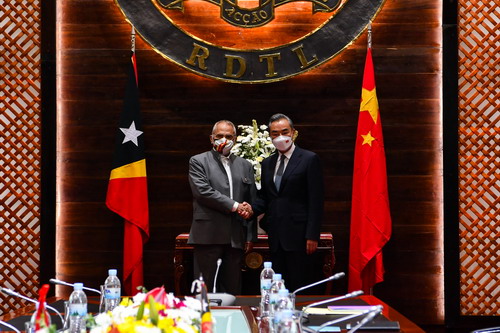
Chinese State Councilor and Foreign Minister Wang Yi meets with President of Timor-Leste José Ramos-Horta in Dili, Timor-Leste’s capital city, on June 4, 2022.
On his last day of his 10-day visit to the Pacific Island countries (PICs), Chinese State Councilor and Foreign Minister Wang Yi met with President of Timor-Leste José Ramos-Horta in Dili, Timor-Leste’s capital city, on Saturday. The two countries vowed to continue to promote the high-quality construction of the China-proposed Belt and Road Initiative, and they reached a series of cooperation agreements.
Marking 20 years of diplomatic relations between the two countries, the Timor-Leste President said that Timor-Leste is grateful to the Chinese government and people for their tremendous support over the long term.
From the very beginning of diplomatic relations between our two countries, we have always firmly adhered to the one-China principle, no matter what difficulties and pressures we have faced, Ramos-Horta said, noting that Timor-Leste has full confidence and expectation in the future of the bilateral relations.
China's development is not only of great benefit to Timor-Leste, but also of great significance to the region and the world, he said.
Wang said that over the past 20 years, the two countries have always treated each other as equals, offered mutual understanding and mutual support, and have become important partners in building the Belt and Road Initiative. China has played an active role in the economic and social development, infrastructure construction and livelihood improvement of Timor-Leste.
China is willing to work with Timor-Leste to take the 20th anniversary of diplomatic relations as an opportunity to sum up successful experiences, promote the comprehensive partnership between the two countries to the next level, and build an example of mutual respect, equality and mutual benefit and common development between large and small countries.
The two sides reached a consensus on strengthening regional cooperation. China supports Timor-Leste to actively participate in regional affairs and looks forward to Timor-Leste’s joining ASEAN, to which Ramos-Horta expressed appreciation.
Both sides agreed to uphold and defend multilateralism. Wang said the Global Security Initiative proposed by Chinese President Xi Jinping had received wide support, and welcomed Timor-Leste's active participation.
During Wang’s visit, China and Timor-Leste reached a number of cooperation, covering economic technology, digital TV, healthcare and other areas.
Ramos-Horta said that although Timor-Leste is a small country, it adheres to principles and advocate peaceful resolution of differences through dialogue, consultation, and unity in addressing the challenges to international peace and security.
On the same day, Wang also met with Timor-Leste's founding father Xanana Gusmão, secretary-general of the Revolutionary Front for an Independent East Timor Mari Alkatiri, and President of Timor-Leste’s National Parliament Aniceto Guterres Lopes, to wrap up the final day of his epic island-hopping visit to the PICs.
During his visit to Timor-Leste, Wang also met with the country’s Prime Minister Taur Matan Ruak and held talks with Minister of Foreign Affairs and Cooperation Adaljiza Albertina Xavier Reis Magno on Friday.
Wang carried out face-to-face meetings, “cloud visits” and virtual connections with 17 leaders of the PICs and more than 30 ministerial officials, and co-chaired the second China-Pacific Island Countries Foreign Ministers' Meeting in Suva, Fiji.
During his visit, China and PICs reached 52 cooperation pacts, covering 15 domains including those under the Belt and Road Initiative, climate change responding, the pandemic, green development, health, trade and tourism, Wang said at a press conference held in Port Moresby, Papua New Guinea, on Friday.
The Chinese Foreign Ministry said that cooperation between China and the PICs is a vibrant "two-wheel drive" with the bilateral main channel and a new multilateral platform.
Combining bilateral and multilateral mechanisms, China and the PICs will usher in a new era for cooperation in domains which include the Blue Economy, education and a response to climate change. Unlike Australia and the US whose long-term approach to the region has been characterized by a condescending stance and coercive policies, China’s concept of treating each country with equality and respect regardless of their size and level of development will win the hearts of all, experts told the Global Times.
Global Times




